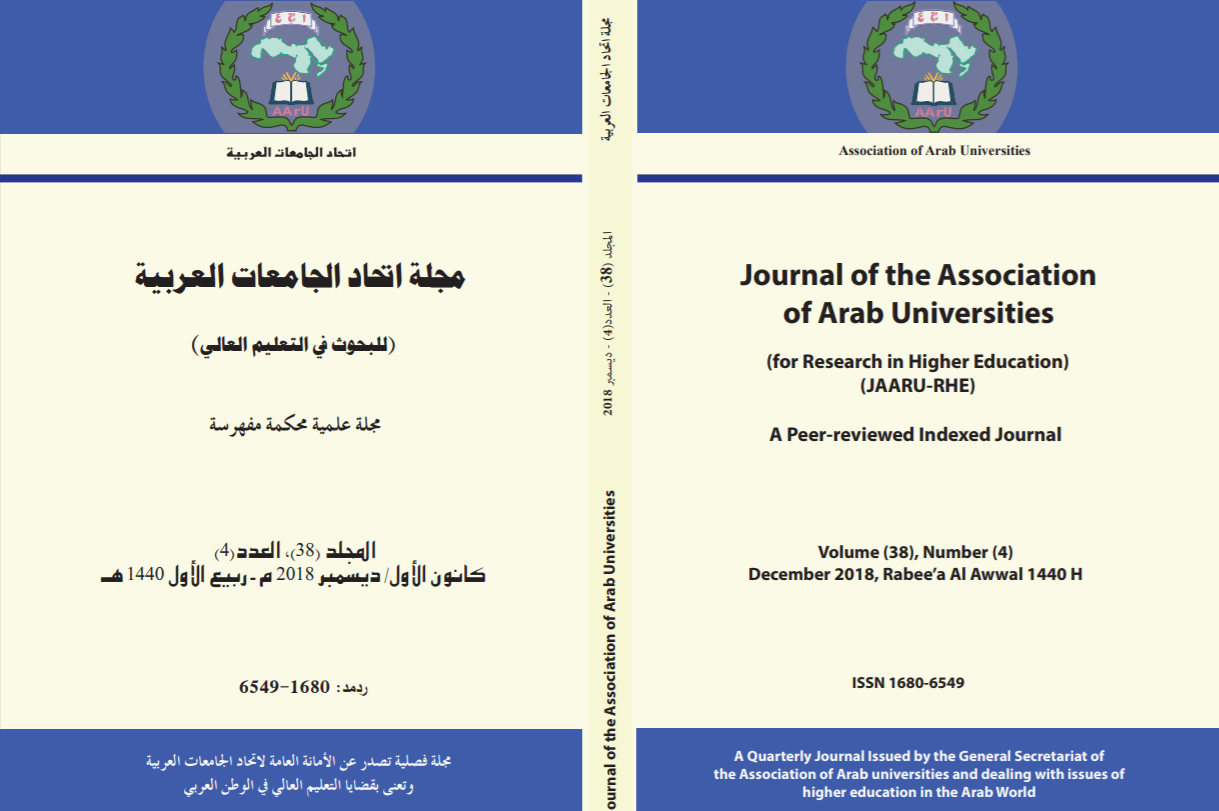Journal of the Association of Arab Universities for Research in Higher Education مجلة اتحاد الجامعات العربية للبحوث في التعليم العالي

Abstract
هدف المقال للكشف عن درجة ممارسة مديري المدارس للقيادة الرقمية وعلاقتها بالرضا الوظيفي لدى المعلمين، وتكوَّنت عينة الدراسة من (230) معلماً ومعلمة من مديرية تربية وتعليم بني عبيد - إربد، واتبعت الدراسة المنهج الوصفي الارتباطي، واستخدمت الدراسة استبانة القيادة الرقيمة، واستبانة الرضا الوظيفي، وتوصَّلت الدراسة إلى أن نسبة القيادة الرقمية لدى مديري المدارس من وجهة نظر المعلمين التي بلغت (71.7%) وهو مستوى "مرتفع"، وأن نسبة الرضا الوظيفي لدى المعلمين التي بلغت (69.3%) وهو مستوى "مرتفع"، وتوجد علاقة ذات دلالة إحصائية (0.491) في القيادة الرقمية واستبانة الرضا الوظيفي، وتوجد فروق ذات دلالة إحصائية بين متوسط القيادة الرقمية لدى مديري المدارس من وجهة نظر المعلمين الأساسية تعزى لمتغير الجنس لجميع الأبعاد لصالح الذكور، ولا توجد فروق ذات دلالة إحصائية بين متوسط القيادة الرقمية لدى مديري المدارس من وجهة نظر المعلمين تعزى لمتغير المؤهل العلمي لجميع الأبعاد، وتوجد فروق ذات دلالة إحصائية بين متوسط استبانة الرضا الوظيفي لدى المعلمين تعزى لمتغير الجنس لجميع الأبعاد لصالح الذكور، ولا توجد فروق ذات دلالة إحصائية بين متوسط استبانة الرضا الوظيفي لدى المعلمين تعزى لمتغير المؤهل العلمي لجميع الأبعاد
The article aimed to reveal the degree of school principals practicing digital leadership and its relationship to job satisfaction among teachers. The study sample consisted of (230) male and female teachers from the Education Directorate of Bani Obeid - Irbid. The study reached the following results: The percentage of digital leadership among school principals from the teachers’ point of view reached (71.7%), which is a “high” level, and that the job satisfaction rate among teachers reached (69.3%), which is a “high” level. Statistically significant (0.491) in digital leadership and the measure of job satisfaction, and there are statistically significant differences between the average digital leadership among school principals from the point of view of basic teachers due to the gender variable for all dimensions in favor of males, and there are no statistically significant differences between the average digital leadership among school principals From the teachers point of view due to the educational qualification variable for all dimensions, and there are statistically significant differences between the mean of the job satisfaction measure of teachers due to the gender variable for all dimensions in favor of males, and there are no statistically significant differences between the average of the job satisfaction measure of teachers due to the educational qualification variable of all dimensions
Recommended Citation
Al Zareer, Zaineb Saleh
(2024)
"درجة ممارسة مديري المدارس للقيادة الرقمية وعلاقتها بالرضا الوظيفي لدى المعلمين,"
Journal of the Association of Arab Universities for Research in Higher Education مجلة اتحاد الجامعات العربية للبحوث في التعليم العالي: Vol. 44:
Iss.
3, Article 11.
Available at:
https://digitalcommons.aaru.edu.jo/jaaru_rhe/vol44/iss3/11

